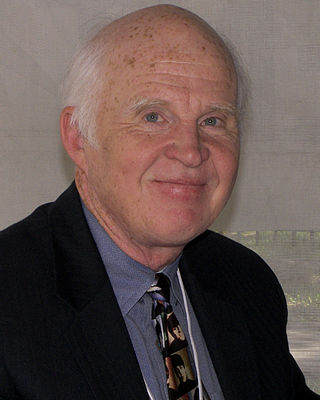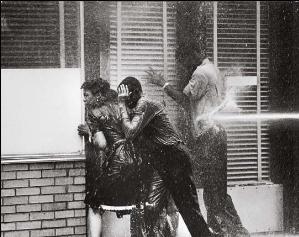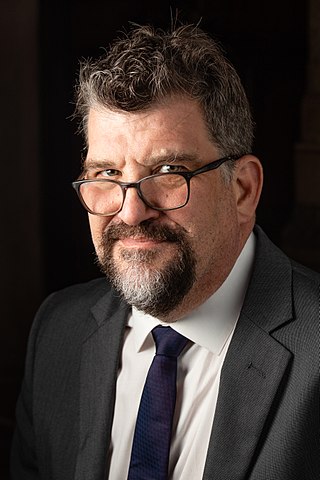Related Research Articles

The Southern Christian Leadership Conference (SCLC) is an African-American civil rights organization based in Atlanta, Georgia. SCLC is closely associated with its first president, Martin Luther King Jr., who had a large role in the American civil rights movement.
A listing of the Pulitzer Prize award winners for 2002:

Theophilus Eugene "Bull" Connor was an American politician who served as Commissioner of Public Safety for the city of Birmingham, Alabama, for more than two decades. A member of the Democratic Party, he strongly opposed the Civil Rights Movement in the 1960s. Under the city commission government, Connor had responsibility for administrative oversight of the Birmingham Fire Department and the Birmingham Police Department, which also had their own chiefs.

Asa Earl Carter was a 1950s segregationist political activist, Ku Klux Klan organizer, and later Western novelist. He co-wrote George Wallace's well-known pro-segregation line of 1963, "Segregation now, segregation tomorrow, segregation forever", and ran in the Democratic primary for governor of Alabama on a white supremacist ticket. Years later, under the pseudonym of supposedly Cherokee writer Forrest Carter, he wrote The Rebel Outlaw: Josey Wales (1972), a Western novel that was adapted into a 1976 film featuring Clint Eastwood that added to the National Film Registry, and The Education of Little Tree (1976), a best-selling, award-winning book which was marketed as a memoir but which turned out to be fiction.
Arthur George Gaston was an American entrepreneur who established businesses in Birmingham, Alabama. He had a significant role in the movement to remove legal barriers to integration in Birmingham in 1963. In his lifetime, Gaston's companies were some of the most prominent African-American businesses in the American South.

Freddie Lee Shuttlesworth was an American minister and civil rights activist who led fights against segregation and other forms of racism, during the civil rights movement. He often worked with Martin Luther King Jr., although they did not always agree on tactics and approaches.

Ralph Emerson McGill was an American journalist and editorialist. An anti-segregationist editor, he published the Atlanta Constitution newspaper. He was a member of the Peabody Awards Board of Jurors, serving from 1945 to 1968. He won a Pulitzer Prize for editorial writing in 1959.

Rebecca Diane McWhorter is an American journalist, commentator, and author who has written extensively about race and the history of civil rights. She won the Pulitzer Prize for General Nonfiction and the J. Anthony Lukas Book Prize in 2002 for Carry Me Home: Birmingham, Alabama, the Climactic Battle of the Civil Rights Revolution.

Taylor Branch is an American author and historian who wrote a Pulitzer Prize winning trilogy chronicling the life of Martin Luther King Jr. and much of the history of the American civil rights movement. The final volume of the 2,912-page trilogy, collectively called America in the King Years, was released in January 2006, and an abridgment, The King Years: Historic Moments in the Civil Rights Movement, was published in 2013.

The Birmingham campaign, also known as the Birmingham movement or Birmingham confrontation, was an American movement organized in early 1963 by the Southern Christian Leadership Conference (SCLC) to bring attention to the integration efforts of African Americans in Birmingham, Alabama.

4 Little Girls is a 1997 American historical documentary film about the murder of four African-American girls in the 16th Street Baptist Church bombing in Birmingham, Alabama on September 15, 1963. The film was directed by Spike Lee and nominated for an Academy Award for Best Documentary.
The Children's Crusade, or Children's March, was a march by over 1,000 school students in Birmingham, Alabama on May 2–10, 1963. Initiated and organized by Rev. James Bevel, the purpose of the march was to walk downtown to talk to the mayor about segregation in their city. Many children left their schools and were arrested, set free, and then arrested again the next day. The marches were stopped by the head of police, Bull Connor, who brought fire hoses to ward off the children and set police dogs after the children. This event compelled President John F. Kennedy to publicly support federal civil rights legislation and eventually led to the passage of the Civil Rights Act of 1964.
David K. Shipler is an American author and journalist. He won the Pulitzer Prize for General Non-fiction in 1987 for Arab and Jew: Wounded Spirits in a Promised Land. Among his other publications the book entitled, The Working Poor: Invisible in America, also has garnered many awards. Formerly, he was a foreign correspondent of The New York Times and served as one of their bureau chiefs. He taught at many colleges and universities. Since 2010, he has published the electronic journal, The Shipler Report. He began co-hosting the blog Two Reporterd in 2021. A collection of his poems was published in 2023.
Lola Mae Haynes Hendricks was corresponding secretary for Fred Shuttlesworth's Alabama Christian Movement for Human Rights from 1956 to 1963. She assisted Wyatt Walker in planning the early portions of the Southern Christian Leadership Conference's involvement in the 1963 Birmingham campaign during the Civil Rights Movement.
The Alabama Christian Movement for Human Rights (ACMHR) was an American civil rights organization in Birmingham, Alabama, which coordinated boycotts and sponsored federal lawsuits aimed at dismantling segregation in Birmingham and Alabama during the civil rights movement. Fred Shuttlesworth, pastor of Bethel Baptist Church, served as president of the group from its founding in 1956 until 1969. The ACMHR's crowning moment came during the pivotal Birmingham campaign which it coordinated along with the Southern Christian Leadership Conference during the spring of 1963.

Bill Hudson was an American photojournalist for the Associated Press who was best known for his photographs taken in the Southern United States during the Civil Rights Movement. The depictions of police brutality against peaceful protesters that were seen in his widely published photographs helped push public support towards the goals of the civil rights movement.

America in the King Years is a three-volume history of Martin Luther King Jr. and the Civil Rights Movement by Taylor Branch, which he wrote between 1982 and 2006. The three individual volumes have won a variety of awards, including the 1989 Pulitzer Prize for History.
The Birmingham riot of 1963 was a civil disorder and riot in Birmingham, Alabama, that was provoked by bombings on the night of May 11, 1963. The bombings targeted African-American leaders of the Birmingham campaign. In response, local African-Americans burned businesses and fought police throughout the downtown area.

John Archibald is an American newspaper reporter and columnist for Al.com. He won the 2018 Pulitzer Prize for Commentary and was the lead reporter on an investigative series that shared the 2023 Pulitzer Prize for Local Reporting. In 2021 he co-hosted a podcast that won an Edward R. Murrow Award.
References
- ↑ "Pulitzer Prize Winners: General Non-Fiction" (web). pulitzer.org. Retrieved 2008-03-14.
- 1 2 3 Shipler, David K. "Bombingham Revisited: A daughter of Birmingham's white elite explores the causes of the city's civil rights violence in the summer of 1963.", The New York Times , March 18, 2001. Accessed June 28, 2010.
- ↑ Hailey, Foster. "DOGS AND HOSES REPULSE NEGROES AT BIRMINGHAM; 3 Students Bitten in Second Day of Demonstrations Against Segregation 250 MARCHERS SEIZED Robert Kennedy Fears Rise in Turmoil--Dr. King Says Protests Will Be Pressed Marchers Are Dispersed DOGS AND HOSES REPULSE NEGROES New Meetings Rumored Water Is Turned On", The New York Times , May 4, 1963. Accessed June 28, 2010.
- ↑ Sedensky, Matt via Associated Press. "Bill Hudson; photojournalist chronicled civil rights era; at 77", The Boston Globe , June 26, 2010. Accessed June 28, 2010.
- ↑ via Associated Press. "Bill Hudson, a Photojournalist During the Civil Rights Era, Dies at 77", The New York Times , June 25, 2010. Accessed June 28, 2010.
- ↑ Mehegan, David. "MCCULLOUGH'S `JOHN ADAMS' WINS" [ dead link ], The Boston Globe , April 9, 2002. Accessed June 28, 2010.

